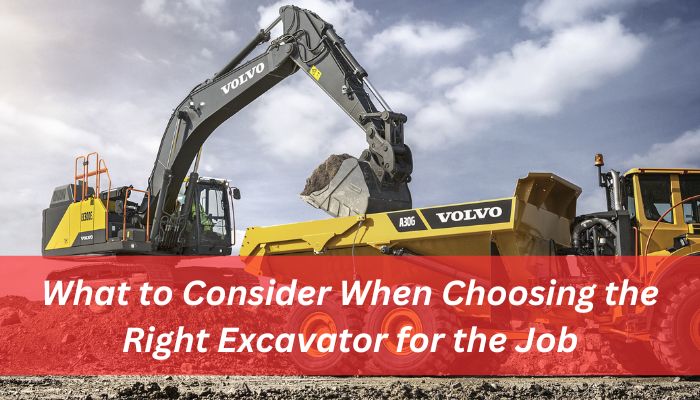What to Consider When Choosing the Right Excavator for The Job – Certainly! Choosing the right excavator for a job is crucial to ensure efficiency, safety, and successful completion of construction or earthmoving tasks. Let’s delve into the key factors you should consider when selecting an excavator:
1. Define Your Project Scope
Before anything else, clearly define the scope of your project. Consider the following questions:
- What type of work will the excavator be performing?
- What are the specific requirements for your job site?
2. Assess the Size and Weight
The size of the excavator matters. Here are some considerations:
- Job Type: Different jobs require varying sizes and weights of excavators. For construction projects, larger and heavier machines are often necessary.
- Soil Conditions: Consider the soil type and its density. Harder soils may require more powerful excavators.
3. Hydraulic Systems and Power
The excavator’s hydraulic system plays a crucial role in its performance. Look for the following:
- Power: Check the power rating of the hydraulic system. It determines the work that can be accomplished during a full workday.
- Efficiency: More powerful hydraulic systems enhance efficiency and productivity.
4. Zero Tail Swing or Zero House Swing
Choose an excavator configuration based on your job site:
- Zero Tail Swing: Allows the excavator to work close to obstacles (walls, dig sites) safely.
- Zero House Swing: Prevents accidental impact with the front and sides during turns.
5. Independent Boom
Most excavators have an independent boom, providing benefits such as:
- Stability: Creates a stable base that requires less movement.
- Visibility: Better visibility for the operator.
6. Attachments
Consider the attachments you’ll need:
- Couplers: Allow quick changes between attachments.
- Buckets: Different sizes for various tasks.
- Rippers: Useful for breaking up hard ground.
- Hammers: For demolition work.
7. Environmental Impact
Think about the environmental impact:
- Fuel efficiency and emissions.
- Noise levels.
Remember, choosing the right excavator involves understanding your project, assessing site conditions, and ensuring the machine aligns with your specific needs. Happy digging! 🚧🏗️
Selecting the Perfect Excavator: A Guide for Your Next Project
Excavator rentals are vital for various tasks, from digging trenches and foundations to demolishing structures and landscaping. But with a vast array of excavators available, choosing the right one for your project can be overwhelming. This guide simplifies the selection process by outlining key factors to consider:
1. Jobsite and Application:
- Work Area: Assess the worksite. Tight spaces call for mini excavators with exceptional maneuverability. Conversely, large, open areas can accommodate standard or large excavators.
- Digging Requirements: Consider the depth and width of trenches or foundations you need to excavate. Larger excavators offer superior digging depth and reach.
- Demolition or Material Handling: For demolition projects or heavy material handling, prioritize excavators with powerful engines and high lifting capacities.
2. Excavator Specifications:
- Engine Power: Engine power determines the excavator’s digging force, lifting capacity, and overall performance. Match the engine power to your project’s demands – heavy-duty tasks necessitate stronger engines.
- Operating Weight: The excavator’s weight should correspond to the jobsite conditions. For instance, soft terrain might require a lighter excavator to minimize ground pressure.
- Lifting Capacity: This refers to the maximum weight the excavator’s arm can safely lift at a specific reach. Ensure the lifting capacity surpasses the heaviest materials you’ll handle.
- Bucket Capacity: The bucket capacity determines the amount of material the excavator can move in each scoop. Larger buckets expedite large-scale projects, while smaller buckets offer more precision for confined spaces.
3. Attachments and Budget:
- Hydraulic Attachments: Many excavators can be equipped with various attachments like breakers, hammers, or grapples. Consider the attachments you’ll need and ensure the excavator can accommodate them.
- Budget: Excavator rentals range in cost based on size, power, and features. Determine your budget beforehand to narrow down your selection.
Beyond these considerations, inquire about the excavator’s fuel efficiency, maintenance requirements, and operator comfort for a well-rounded decision.
By carefully evaluating these factors, you’ll select the excavator that perfectly matches your project’s needs, ensuring optimal efficiency and cost-effectiveness.
